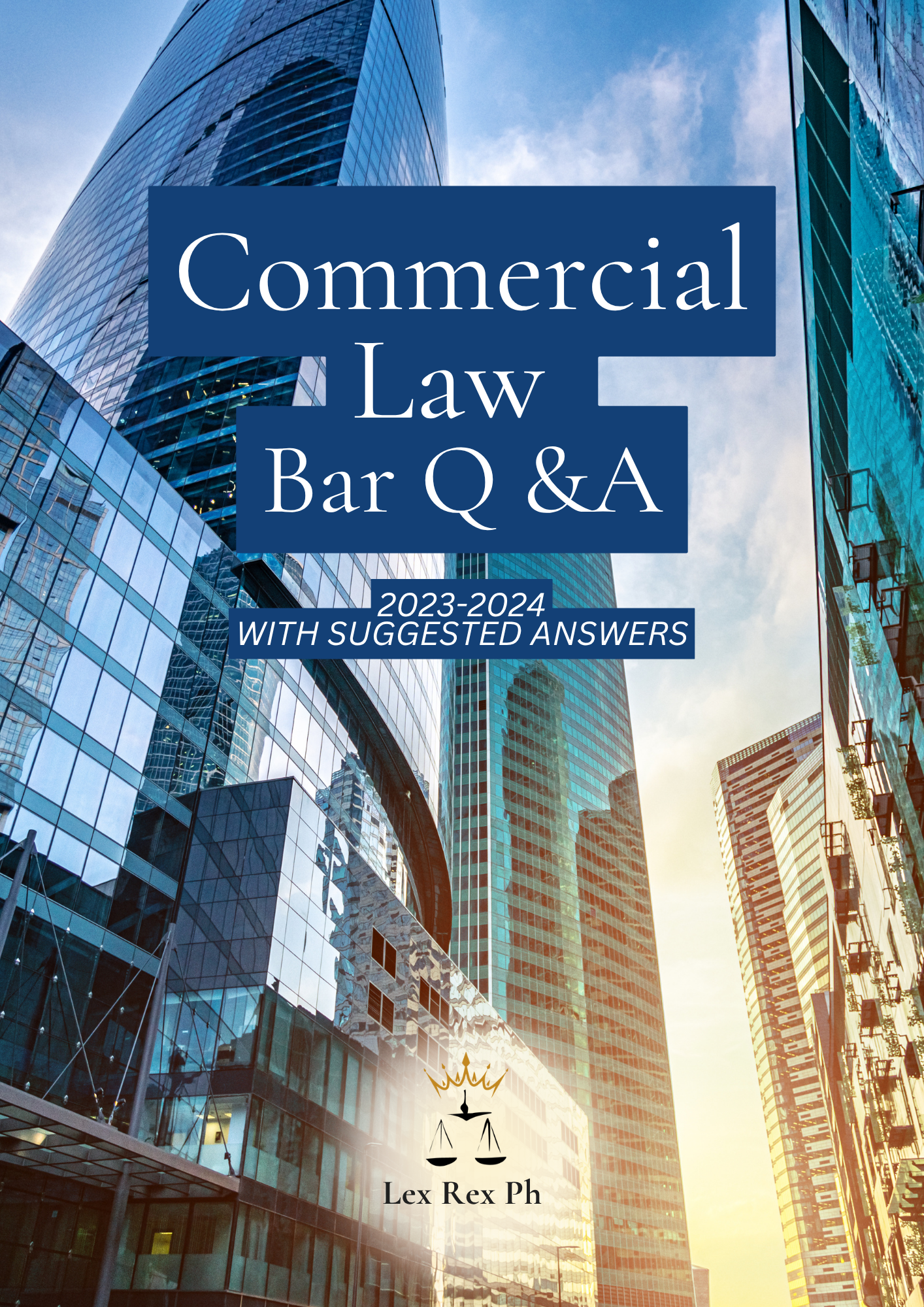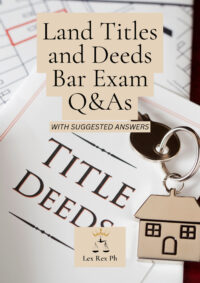₱99.00
Coverage: Bar 2023-2024
This ebook, “Commercial Law Bar Q&As”, contains suggested answers and expanded commercial topics related to such answers. It dissects Corporation Code principles, banking regulations, and insurance law intricacies. Furthermore, it explores Foreign Corporations, Transportation Law, Intellectual Property, and critical special legislation including FRIA, DPA, Electronic Commerce Act, Public Service Act, and Competition Act. This resource is helps enhance understanding and preparation.
Description
Coverage: Bar 2023-2024
This “Commercial Law Bar Q and As” EBook offers a concentrated review of commercial law topics, which can be a valuable aid for law students and bar examination candidates. It aims to help clarify complex principles across various fields, supporting a deeper understanding of the subjects often encountered in examinations [EBook Description].
I. Navigating Corporation Code Concepts This section can assist in understanding various elements of the Corporation Code:
- Articles of Incorporation (AOI): This EBook covers requirements for AOI approval, including the need for a principal office within the Philippines and the residency of key corporate officers (Treasurer, Secretary). It also outlines grounds for SEC rejection due to non-compliance.
- Corporate Names: You might find insights into corporate names as property rights and the SEC’s approval process based on distinguishability. The text helps identify what does not make a name distinguishable (e.g., common corporate terms, punctuation). It also explains the SEC’s verification process and the potential consequences of non-compliance, such as cease and desist orders or registration revocation. A name change, it notes, does not create a new entity or alter existing liabilities.
- Corporation by Estoppel: This section discusses this equitable doctrine, which may prevent parties from denying corporate existence after dealing with an ostensible entity. It explores how this principle can validate contracts, even donations, if the entity was treated as a corporation without fraud. The EBook also touches on the effects, such as personal liability for those acting without authority and parties being barred from denying personality, along with its limitations.
- Trust Fund Doctrine: It reviews this principle, where capital stock and assets are considered a trust fund for creditors. Key implications include restrictions on releasing unpaid subscriptions or declaring dividends from capital to the prejudice of creditors.
- Corporate Dissolution: This EBook explains that corporate term expiration leads to automatic dissolution. It clarifies the three-year winding-up period, noting its purpose is for settling affairs, not continuing business. Revival processes are also touched upon.
- Dividends: A general overview covers dividend types (cash, property, stock, liquidating) and declaration requirements, emphasizing that they generally come from unrestricted retained earnings. Approval processes for different dividend types are outlined (Board for cash/property; Board + 2/3 OCS for stock). Restrictions and tax implications are also discussed.
- Board Vacancies & Meetings: This part provides a review of rules for filling Board vacancies, distinguishing between those due to term expiration (stockholders’ role) and other causes (Board’s role if quorum exists). It also covers procedures for reporting non-held elections to the SEC. Concepts like “hold-over capacity” and the “Emergency Board” (a temporary measure for corporate continuity during a quorum loss) are also presented.
- Non-Voting Shares & Outstanding Capital Stock: The EBook helps define “outstanding capital stock” for quorum purposes. It also lists shares generally not included in quorum or voting calculations (e.g., non-voting, treasury, delinquent, unregistered shares). The concept’s role in Filipino ownership requirements is also addressed.
- Close Corporation: The discussion outlines characteristics typically found in a close corporation’s Articles of Incorporation, such as limits on shareholder numbers, transfer restrictions, and prohibitions on public offerings. It also addresses the disqualification criteria for a corporation to be considered a close corporation if a non-close corporation owns a significant portion of its voting stock.
II. Exploring Partnership and Banking Law
- Partnership Law: This section reviews rules concerning partners engaging in separate businesses, noting absolute prohibition for industrial partners and relative prohibition for capitalist partners to prevent unfair competition.
- Secrecy of Bank Deposits: It highlights the general confidentiality of deposits in Philippine banks (peso and foreign currency). It also explains the various, strictly construed exceptions for inquiry or disclosure, including specific situations where a court order may or may not be needed. The principle that “subject matter of litigation” refers to the money itself, not merely evidence, is clarified.
- Close Now, Hear Later Doctrine: This EBook discusses the Monetary Board’s power to summarily close banks without prior hearing when conditions like illiquidity or unsound practices are present, aiming to protect public interest.
- Money Laundering (AMLA): It covers the definition of money laundering and provides examples of predicate crimes. The functions of the Anti-Money Laundering Council (AMLC) are outlined. It also clarifies that liability for money laundering does not necessarily require participation in the underlying predicate crime, and that lawyers, when acting as independent legal professionals, may be excluded from “covered persons”.
III. Reviewing Insurance and Foreign Corporations
- Insurable Interest: This topic defines insurable interest as a pecuniary benefit or loss from property’s preservation or destruction. It explains that both mortgagor and mortgagee generally hold insurable interests.
- Cash-and-Carry Principle: The EBook reviews the general rule that premium payment is required for policy validity, along with important exceptions like grace periods, installment agreements, or an insurer’s authorized agent acknowledging receipt of payment.
- Incontestability Period: For life insurance, it explains that after two years in force, an insurer generally cannot deny claims based on concealment or misrepresentation.
- Foreign Corporations: This section helps in understanding the 60% Filipino ownership requirement for land ownership, specifying that this applies to both voting and non-voting capital. It also explains that while unlicensed foreign corporations generally cannot sue, the doctrine of “corporation by estoppel” might apply if a Philippine entity has contracted with them.
IV. Insights into Transportation and Intellectual Property
- Common Carriers: Common carriers are broadly defined as entities transporting for compensation, and they are held to an extraordinary diligence standard.
- Unfair Competition: This is described as passing off goods through confusingly similar appearance with intent to deceive. It is noted that prior trademark registration is not required for an unfair competition claim.
- Trademark Infringement: This topic focuses on the unauthorized use of registered trademarks. It introduces the “Dominancy Test” as the current standard, which emphasizes the dominant features and visual/aural impressions of a mark, superseding the “Holistic Test”.
- Copyright: The EBook clarifies that copyright ownership generally vests with the author or creator from the moment of creation. For commissioned works, copyright typically remains with the creator unless a written stipulation states otherwise. It also explains that copyright protects expression, not ideas.
- Fair Use Doctrine: This section explores fair use as a limitation on copyright. It outlines the four-factor test for determining fair use (purpose, nature of work, amount used, market effect) and discusses the “Transformative Test”.
- Patent Registration: A key distinction is made: copyright on a drawing does not protect the underlying invention, which would require patent protection.
- IP Expiration Periods: A table summarizes the general expiration periods for Copyright, Trademark, Unfair Competition, and Patent.
V. Grasping Special Laws and Rules
- FRIA (Financial Rehabilitation and Insolvency Act): The EBook defines “insolvency” as inability to pay liabilities as they fall due or liabilities exceeding assets. It explains that suspension of payments is for individual debtors only, and discusses various rehabilitation and liquidation options for juridical entities. It also touches on the “stay order” and the “cram-down” effect, allowing rehabilitation plans to proceed despite creditor objections.
- Data Privacy Act (DPA): This section reviews definitions of personal and sensitive personal information. It outlines general data privacy principles (transparency, legitimate purpose, proportionality), lawful bases for processing information (e.g., consent, legal claims), and data subject rights (e.g., right to be informed, access, object).
- Electronic Commerce Act: This EBook discusses the functional equivalence and admissibility of electronic data messages and documents. It clarifies that screenshots can serve as electronic data messages, but also notes that the Act does not modify formalities for document validity.
- Public Service Act: This section distinguishes between “public service” and “public utility”. It highlights Filipino ownership requirements for public utilities and critical infrastructure (e.g., telecommunications), including the prohibition for foreign state-owned enterprises in such sectors.
- Competition Act: The EBook clarifies that market dominance itself is generally not unlawful; only the abuse of a dominant position is prohibited. It suggests that gaining market share through legitimate competitive strategies, like offering better value or efficient distribution, typically does not violate competition law.
This EBook aims to provide a structured approach to studying commercial law, offering explanations that could be helpful for anyone preparing for the bar examination.



